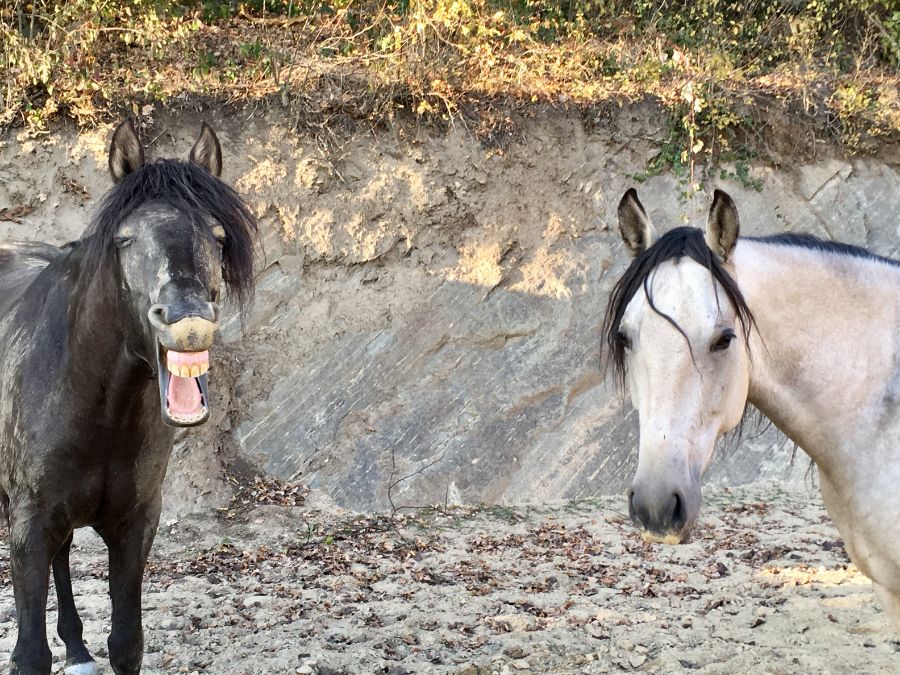
So, do you have to yawn now too?
Mirror neurons are a network of nerve cells that make it possible to empathize with other people or animals. Empathy can be learned to a certain extent.
and how it would improve the lives of all horses in the future
“Yes, I’ve been thinking for months that there’s something wrong with __________ (fill in any number of things: the hay, the saddle, the teeth, the hooves, the training approach, the stable… the list goes on and on)…”. “Then why didn’t you take action?”. “Yes, I called in expert XY and was told that…”.
A dialog that probably every horse person knows from one role or another and which causes the horse tied up next to it to take a deep breath in order to add a comment from the person concerned to what has been said. It is worth considering why action is often not taken earlier for the benefit of the horse, even though the necessary knowledge is available.
An example from practice. A well-fed and only 4-year-old Noriker was broken in only a few months previously and already shows clear atrophy in the saddle area with accompanying tension in the back. During the conversation it becomes clear that this is not due to a lack of love for her horse on the part of the rider, who weighs only 55 kg, or to financial issues, but rather to the fact that she relied too long on contrary opinions and acted too late according to her own feelings. My conclusion from many conversations: Sometimes there is a lack of knowledge or money, but often also a lack of orientation in the hippological jungle of opinions and trust in one’s own feelings.
The reasons for this probably lie in a certain orientation mode that we adopt out of reverence and self-protection in our very first contacts with these impressively beautiful animals. Fascinated, we don’t want to do anything wrong and of course don’t want to be hurt by these big animals and listen to those who teach us how to do things with horses. With the best of intentions, we now base our actions with horses on two-legged competence, while four-legged competence remains unquestioned. At some point, someone will rush their frightened horse round and round the bends because someone has convincingly explained how much this would loosen their back or because the rider has declared themselves the center of competence from a certain point on.
As a rule, riding lessons teach us something about riding or horses right from the start and not enough about reading our horse, then trusting this assessment and acting accordingly. At the latest when you are confronted with a serious problem with your first horse (the horse’s first warning signals often go unheeded), you are confronted with a multitude of opinions, experiences and advice that leave you perplexed. This is due to the fact that the mammal horse is already complex with its psyche and physique alone. In combination with other factors, such as equipment accessories, forms of husbandry, training methods, rider and much more, this results in a further immense dimension of complexity. The nature of complex systems is such that it is difficult to precisely assign causalities (i.e. what caused what) and so, unintentionally, false conclusions are quickly drawn.
This is why there is always a wealth of advice on a problem in the horse sector: “Everyone says something different… XY even says the exact opposite! Who should I believe now?” you then hear from the discouraged other person. That is precisely the point. There are many answers to complex questions, but in many cases the ability to understand your horse’s mental and physical well-being is the only way to sift out what is effective from what is not. The motto “try out and analyze” of existing solutions is often unavoidable, as are misguided approaches whose effects can be minimized by taking rapid countermeasures.
As a rider, in addition to knowledge of horse behavior, you can’t avoid trusting your own empathy for your own horse. This trust and subsequent impulses for action can be encouraged, ideally of course if this is done from an early age by caregivers (which can also include riding instructors). Therefore, every riding lesson should specifically strengthen the ability to empathize with horses, as the VÖR, for example, has set out to do.
Riding schools are the first stop for every future horse owner and thus set the course for the way in which the future horse will be handled. Knowledge and further training are important for horse owners, because healthy, happy riding horses are a complex matter in themselves and therefore require expert knowledge. In order to be able to make targeted decisions for the benefit of your own individual horse after acquiring knowledge, empathy is essential, because nobody knows your horse better than you. For the benefit of all future private horses, “empathizing with and acting for my horse” should therefore play a central role in every riding lesson.

